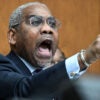By the summer of 1776, Americans were already engaged in open conflict against the British Empire. The Colonies’ efforts to remedy their political grievances by appealing to King and Parliament had failed. It became clear that in order to protect its liberties, America would have to take “command of its own fortunes”, as George Washington would later put it. On June 7, 1776 Richard Henry Lee, a delegate from Virginia, stood to present a resolution to the Second Continental Congress gathered at Philadelphia:
Resolved, That these United Colonies are, and of right ought to be, free and independent States, that they are absolved from all allegiance to the British Crown, and that all political connection between them and the State of Great Britain is, and ought to be, totally dissolved.
John Adams firmly seconded Lee’s motion. It was a revolutionary resolution formally calling for American independence. Confident that the Resolution would pass, Congress appointed a committee to draft a statement announcing the reasons for and significance of American independence. This Committee of Five, as it was called, consisted of Thomas Jefferson of Virginia, John Adams of Massachusetts, Benjamin Franklin of Pennsylvania, Robert R. Livingston of New York, and Roger Sherman of Connecticut.
On July 2, 1776 the Second Continental Congress passed Lee’s Resolution of Independence. The next day, July 3, John Adams wrote his wife, Abigail:
The second day of July, 1776, will be the most memorable epoch in the history of America. I am apt to believe that it will be celebrated by succeeding generations as the great anniversary festival. It ought to be commemorated as the day of deliverance, by solemn acts of devotion to God Almighty. It ought to be solemnized with pomp and parade, with shows, games, sports, guns, bells, bonfires, and illuminations, from one end of this continent to the other, from this time forward forever more.
Adams’ prediction was correct, except for the day. From the start, July 4th has been the day on which we celebrate America’s independence; for it was on that day in 1776 that Congress adopted the language of the Declaration of Independence as drafted by the Committee of Five. The Declaration was much more than a political act; it was our statement to the world articulating the universal principles of liberty, justice, and human equality. These self-evident truths compelled America to declare its independence and provided the principles upon which the future government of the United States would be founded.
The ideals of America’s founding are timeless ; yet, the cause of freedom is never completely won. Those Founding Fathers who voted for independence, signed the Declaration of Independence, and debated the Constitution understood that these universal principles could only be realized through the conviction, sacrifice, and perseverance of a particular people. In this sense, the American people’s quest for independence became indistinguishable from the cause of liberty.
But this cause is contested today both domestically and internationally. Domestically, Progressives reject America’s first principles and separation of powers established by the Constitution. Abroad, tyrants and terrorists try to extinguish Lady Liberty’s flame. American sovereignty is also increasingly threatened by international institutions that have little respect for the Rule of Law and self-government.
In 1826, on the 50th anniversary of American Independence, an aged John Adams was asked to sum up the significance of the American Revolution and the prospects for the young United States. With his last public words, Adams replied: “Independence forever!”































3 Replies to “Resolved: America Ought To Be Free!”